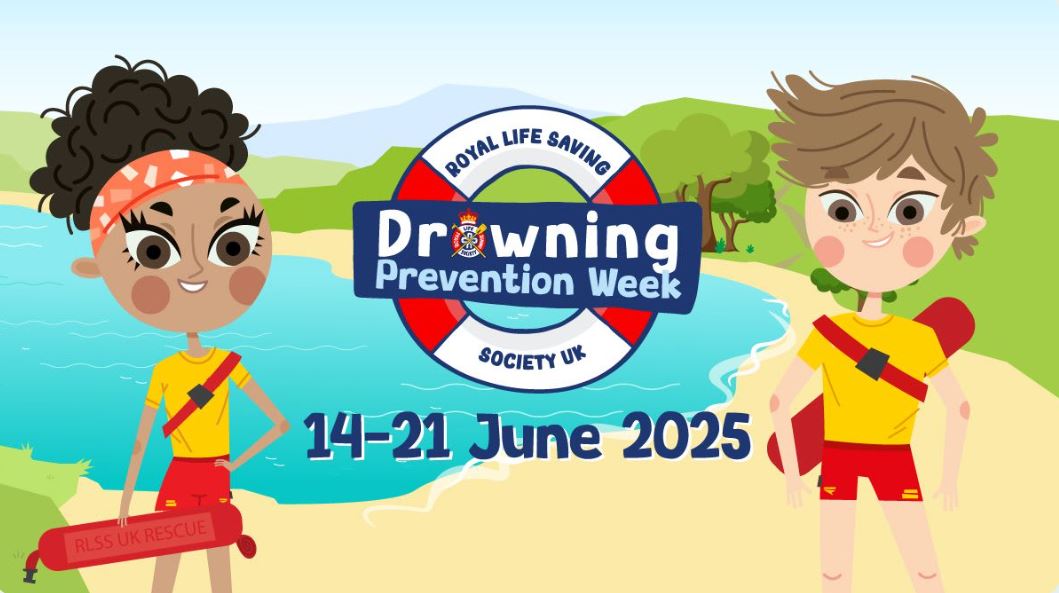
It's Drowning Prevention Week. Here is some important information from our partner Royal Berkshire Fire and Rescue Service.
As the peak of summer approaches, Royal Berkshire Fire and Rescue Service (RBFRS) is reminding the public to stay safe in and around the water.
To help keep people safe, the Service is once again supporting the Royal Life Saving Society’s (RLSS) Drowning Prevention Week, starting on Saturday, 14 June until Saturday, 21 June.
Speaking on the campaign, Paul Scott, Prevention Manager at RBFRS, said: “While it is important to enjoy the great weather during the summer, it is equally important to be safe when doing so.
“Remember to respect the water. Summer is a time to be wary of the dangers of water and to remain vigilant when swimming.
“In particular we would like to remind young people of these hazards, specifically teenagers and young adults, who have repeatedly been shown to be proportionately more likely to lose their lives swimming.
“Whilst open water might look inviting in the summer, hidden currents and cold water shock, caused by the sudden change of temperature between the air and water, can catch even the best swimmers off guard.
“Please don’t jump into rivers from bridges, don’t drink alcohol before swimming and never swim alone. If you want to go swimming, make sure that there is a lifeguard present or join an organised open water swimming group.
“If you see someone in difficulty, remember ‘Call, Tell and Throw’ – Call 999 and ask for either the fire service at inland waters or the coastguard at the beach. Tell the person to float on their back and throw something to them to help them float. Look out for your friends and family!”
Research by the Water Incident Database (WAID) has highlighted that higher air temperatures bring a heightened risk of drowning. 47 percent of accidental drownings in the UK occur between May and August.
Statistics under a nationwide study further demonstrate that there is a fivefold increase in accidental drowning risk when compared to days with an average temperature of 10°C.
RBFRS continues to support the National Drowning Prevention Strategy implemented by the National Fire Chief’s Council (NFCC), which aims to halve accidental drowning fatalities by 2026.
In line with this goal, the NFCC emphasises the importance of knowing the Royal Life Saving Society’s (RLSS) Water Safety Code. Before going swimming, please remember:
Stop and Think
Enter any bodies of water slowly and carefully, never jump from heights, and ask yourself, is the area safe? Ensure you think about all the hazards, including whether the water is too deep or too shallow, the strength of any currents or tides, and the presence of underwater objects.
Remember, you never know what could be below the surface. There could be unseen currents and reeds, which could pull you under when you least expect.
Think about the temperature of the water. Cold water shock, which is the reaction of your body when entering cold water, can have harmful effects, including weakening of the muscles, breathing in of water, and even abnormal heart rhythm; ultimately resulting in death. Anything below 15°C is considered cold water, and the average UK and Ireland sea temperatures are just 12°C. Even in summer, be wary of cold water.
Do not enter the water after having consumed alcohol. Avoid walking routes near water if you are under the influence of alcohol. The sedative effect of alcohol will slow your reaction time, compounding the already present dangers of water.
Stay Together
Only swim in lifeguarded areas at the beach and always ensure someone is available to raise the alarm in case of an emergency.
61 percent of accidental water-related fatalities in 2024 occurred at inland waters such as lakes and rivers. This emphasises the significance of the presence of lifeguards in reducing deaths. In the absence of lifeguards, ensure parental supervision.
Enter the water slowly, stay within reach, and keep to a standing depth.
In an Emergency... Call 999
Ensure that everyone in your group knows who to call in an emergency. Ask for the Coastguard if you are at the coast. Anywhere else, ask for the fire and rescue service and an ambulance.
Never enter the water to try and save someone, even if you are a strong swimmer. Instead, shout to the person ‘swim to me’, and use any lifebelts or throw bags that may be available; ensuring if they are attached to a rope to secure it or to hold the end of it. If there is no equipment of this kind, look for anything that can float, and throw it to them. Tell the person to float on their back.
Float to Live
If you fall in or become tired, stay calm and float on your back until the effects of cold-water shock pass. Bear in mind that moving water will rob you of heat 250 times more quickly than still water. When the effect has passed, either call for help or swim to safety.
Ensure you and your group know basic water safety and what to do if someone finds themselves unexpectedly in water. Free RLSS UK resources for parents are available.
For further information and more safety advice concerning being in or around water, visit the Water Safety page on the RBFRS website.

